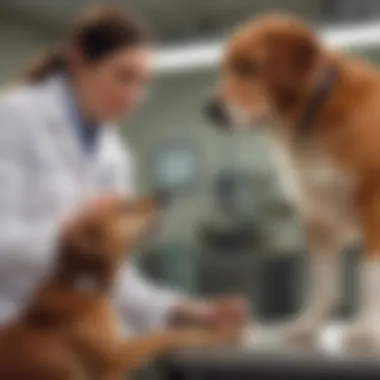Understanding Diarrhea in Older Dogs: Causes & Care


Intro
Diarrhea in older dogs is an issue that many pet owners face at some point. Understanding the multifaceted reasons behind this condition is essential for maintaining your dog's health. As dogs age, their bodies undergo numerous changes that can influence digestive health. Factors such as diet, existing health problems, and even the environment can all contribute to gastrointestinal upset.
It is crucial for dog owners to identify symptoms, determine the underlying causes, and intervene effectively. With a comprehensive understanding, you can ensure that your beloved pet leads a healthy and comfortable life. This article aims to provide detailed insights into the various aspects of diarrhea in aging dogs, focusing on prevention and management strategies while exploring the related factors that can affect their well-being.
Understanding Your Pet
As your dog ages, you must pay attention to their unique requirements. This section explores essential breed traits, common temperaments, and the special needs of older dogs.
Breed Traits
Certain dog breeds may be more prone to digestive issues. Breeds like Dachshunds and Boxers, for example, can have varying dietary sensitivities. These sensitivities may cause frequent gastrointestinal disturbances, including diarrhea. Each breed has unique characteristics that can impact their health, so understanding these traits helps tailor care and diet accordingly.
Common Temperaments
Older dogs might also exhibit changes in temperament due to health challenges. Behavioral shifts can signify underlying pain or discomfort. A dog that was once friendly may become withdrawn or irritable, which can complicate their care. Taking note of these changes provides important clues about their overall health condition.
Special Needs
Older dogs often experience special needs that differ from their younger counterparts. They may require more frequent vet visits, specialized diets, and more manageable exercise routines. Understanding these needs can help you make informed decisions to improve their quality of life.
Pet Care Essentials
Proper care is fundamental when it comes to handling issues like diarrhea in older dogs. This section focuses on critical aspects, including nutrition, grooming, and overall wellness strategies.
Nutrition and Feeding Guidelines
A balanced diet is key to preventing digestive issues. Older dogs need nutrients that support their aging bodies. Opting for high-quality dog food formulated for senior pets is essential. Look for:
- Adequate protein sources
- Digestible carbohydrates
- Healthy fats to maintain energy levels
Monitor your dog’s weight, as obesity can lead to additional health problems.
Grooming Tips and Techniques
Keeping your dog clean and well-groomed can help identify any skin irritations or other health problems. Regular brushing helps maintain coat health and monitor for any unusual signs. Additionally, dietary changes can sometimes lead to skin issues, which highlight the importance of comprehensive care.
Health and Wellness
Regular check-ups with the veterinarian are crucial as they become more susceptible to health issues. Condition like kidney disease, liver problems, or even hormonal imbalances can be underlying causes of diarrhea. Establish a routine for health monitoring, including vaccinations and dental care, to help prolong their health.
The End
Navigating the complexities of your older dog’s health is vital. Diarrhea, while common, can be indicative of underlying issues that need addressing. By understanding breed characteristics, common behavioral changes, and tailored care essentials, you can take significant steps to ensure a healthier, happier life for your pet.
Preface to Canine Diarrhea
Diarrhea in older dogs is a significant health concern that demands attention from pet owners. Understanding this condition helps in protecting the well-being of canine companions. The importance of this topic goes beyond mere discomfort; it can indicate underlying health issues that may require immediate veterinary care. By grasping the implications of diarrhea, owners can better react and manage their dog's health effectively.
Definition and Importance
Canine diarrhea is characterized by an increase in the frequency, fluidity, and quantity of a dog’s feces. It can stem from a variety of causes. For older dogs, diarrhea is more than just an occasional upset stomach. It can signal dietary issues, infections, or serious health conditions such as kidney disease or cancer. The urgency comes from the fact that ongoing diarrhea can lead to dehydration. Therefore, recognizing and addressing this issue promptly can make a significant difference in the overall health and happiness of a pet.
Aging and Digestive Health
As dogs grow older, their digestive systems may become less efficient. Aging can lead to changes in gut flora, decreased production of digestive enzymes, and a lower tolerance for certain foods. Older dogs might also be more prone to other health issues, making them susceptible to gastrointestinal disturbances.
Understanding these changes is crucial for pet owners. Dietary adjustments may be necessary to accommodate the dog's changing digestive health. For example, a diet higher in fiber can often help to stabilize stool consistency. Monitoring an older dog's diet and how they respond to various foods can be essential in managing their overall digestive function.
Common Causes of Diarrhea in Older Dogs


Understanding the common causes of diarrhea in older dogs is essential to ensure their well-being. This insight helps pet owners identify symptoms and seek appropriate care. Diarrhea can be more than just an inconvenience; it can indicate underlying health issues that require attention. By being aware of the various factors that contribute to this condition, caregivers can act swiftly to alleviate discomfort and prevent complications.
Dietary Changes
Dietary changes can trigger digestive disturbances in older dogs. As dogs age, their intestines may become less efficient in processing certain foods. Sudden alterations in diet, such as the introduction of new brands or types of food, can lead to gastrointestinal upset. Older dogs are particularly sensitive to rich or fatty foods that they may have tolerated in their youth.
- When altering a dog's diet, do so gradually. Mixing the new food with the old over several days can minimize upset.
- Consider age-specific food formulations. These diets often have balanced nutritional profiles tailored for older dogs' digestive needs.
- Ingredient quality matters significantly. Ensure that the chosen food is high-quality and free from fillers that could exacerbate digestive issues.
Infections and Parasites
Infections and parasites are frequent culprits behind diarrhea in aging dogs. Both viral and bacterial infections can cause severe gastrointestinal distress. Additionally, older pets may be at higher risk for infections due to immune system decline.
Common sources of infection include:
- Contaminated food or water
- Contact with infected animals
Parasites like Giardia and intestinal worms can also contribute to gastrointestinal problems. Regular veterinary checks and stool examinations are crucial to identify and treat these issues promptly. Special attention should be given to any change in a dog's behavior or energy levels during these times.
Chronic Health Conditions
Chronic health conditions like kidney disease, liver dysfunction, and pancreatitis are prevalent among older dogs and can lead to diarrhea. These conditions affect the body's ability to absorb nutrients and manage waste effectively.
- Kidney Disease: Can lead to imbalances in electrolytes, resulting in loose stools.
- Liver Dysfunction: Impairs digestion and nutrient absorption, leading to diarrhea.
- Pancreatitis: Often manifests in diarrhea, which may be accompanied by vomiting or lethargy.
Impact of Diet on Digestive Health
The role of diet is crucial in maintaining the digestive health of older dogs. As dogs age, their nutritional needs change, thus impacting their overall health and well-being. Poor dietary choices can aggravate existing health issues or lead to new problems, including digestive disturbances like diarrhea. Recognizing how diet influences your dog's digestive system will empower owners to make informed decisions, potentially preventing health issues before they arise.
Nutritional Requirements for Older Dogs
Older dogs have different nutritional requirements compared to younger dogs. Their metabolism slows down, and they may require fewer calories. However, this does not mean that their food can be less nutritious. Foods rich in high-quality protein, essential fatty acids, vitamins, and minerals are important for their maintenance and repair of body tissue.
Moreover, foods that are high in fiber can improve digestive health. Fiber can assist in regulating bowel movements and help prevent constipation. Pet owners should focus on finding a balanced diet that meets the unique needs of their aging dogs. Reading food labels carefully is an important step in this process.
Common Food Sensitivities
As dogs age, they may develop food sensitivities where they previously had none. Older dogs can experience reactions to ingredients like grains, beef, or chicken. Symptoms may include gastrointestinal upset, such as diarrhea, vomiting, and gas. Identifying and eliminating these triggers from their diet can help manage symptoms.
An elimination diet might be a good approach in these cases. Gradually introduce new foods while monitoring their reactions. Consulting with a veterinary professional can aid in this process to ensure all nutritional needs are met without aggravating sensitivities.
Quality of Ingredients
The quality of ingredients in dog food directly affects a dog's digestive health. High-quality ingredients are usually more digestible and provide better nutrient absorption. Foods with fillers, artificial preservatives, and low-quality meats can lead to digestive problems. Pet owners should prioritize buying foods that list real meat as the first ingredient and avoid those with vague terms like "meat by-products.”
Incorporating whole foods, like cooked vegetables or grains, can also enhance digestive health. Always consult with a vet to address any specific health concerns or dietary changes.
It is important to adapt your older dog's diet closely to their changing needs, ensuring their good health and longevity.
Symptoms to Observe in Older Dogs
Observing symptoms in older dogs is crucial for pet owners. These signs often indicate underlying issues that may require attention. With age, dogs may experience a decline in their digestive health, making it essential to recognize any changes in their behavior and bodily functions. Quick identification of symptoms can lead to timely interventions, potentially preventing serious health problems.
Frequency and Consistency of Stool
The frequency and consistency of a dog's stool are primary indicators of digestive health. Healthy dogs typically have a routine, producing solid, well-formed stools once or twice daily. In contrast, an increase in frequency or a change in consistency can signal issues. Diarrhea could manifest as a sudden increase in the number of bowel movements or liquid, watery stools. Monitoring these changes is vital. Frequent, loose stools can lead to dehydration, especially in older dogs, who are less resilient. Noticing these shifts early may help in managing the dog's health effectively.
- Solid stool should be:
- Signs of diarrhea may include:
- Firm
- Moist
- Easy to pick up


- Watery texture
- Color changes
- Unpleasant odor
Accurate records of stool patterns can aid veterinarians in diagnosing potential complications. Regular monitoring forms a connection between the dog’s diet and overall health, so pet owners should remain attentive.
Accompanying Symptoms
Accompanying symptoms are pivotal in evaluating the overall condition of an older dog experiencing diarrhea. It is important to note other health aspects, as diarrhea might not be an isolated issue. Common accompanying symptoms include:
- Vomiting
- Lethargy
- Loss of appetite
- Abdominal pain or bloating
- Increased thirst
The presence of these symptoms can suggest more serious health issues. For example, lethargy and loss of appetite can infer a systemic problem rather than just digestive upset. These signs should not be ignored; if they occur alongside diarrhea, veterinary consultation is warranted.
Furthermore, older dogs might exhibit behavioral changes that can signify discomfort or distress. If a dog appears withdrawn or less interactive, this could indicate something beyond mere digestive issues. Pet owners must be vigilant observers.
"Timely observation of symptoms can significantly impact the outcome of a dog's health management."
When to Seek Veterinary Assistance
Seeking veterinary assistance is crucial for dog owners when gastrointestinal issues arise, especially diarrhea, which can often indicate underlying health problems. Timely intervention can prevent minor issues from escalating into severe conditions that might threaten your dog's well-being. Knowing when to reach out to a veterinarian can be lifesaving.
Indicators of Severity
Pet owners should monitor their dogs closely for specific symptoms that indicate the severity of diarrhea. Some critical signs to watch for include:
- Duration: If diarrhea lasts more than 24 hours, it is essential to seek veterinary help.
- Frequency: Increased bathroom visits can lead to rapid loss of vital minerals and fluids.
- Blood or Mucus: Presence of blood or a significant amount of mucus in the stool is a red flag.
- Vomiting: If diarrhea is accompanied by vomiting, it may suggest a more serious issue.
- Lethargy: A noticeable decline in energy levels can signal significant health concerns.
- Loss of Appetite: If your dog refuses to eat for more than a day, this may indicate a need for medical assessment.
Addressing these indicators with your vet will allow for proper evaluation and treatment options, ensuring that your dog receives the necessary care.
Understanding Dehydration Risks
Dehydration is a significant risk associated with diarrhea, particularly in older dogs. Dogs can lose a significant amount of fluids rapidly, leading to dangerous levels of dehydration. Here are important factors to consider:
- Signs of Dehydration: Look for symptoms like dry gums, excessive panting, sunken eyes, or skin that does not return to normal when you pull it up gently. These signs may indicate that your dog requires medical attention.
- Hydration Assessment: Monitoring your dog's water intake is essential. If the dog is not drinking enough fluids, it may worsen dehydration.
- Immediate Action Required: If any dehydration symptoms are evident, contact your veterinarian immediately. They may recommend rehydration solutions or fluids administered intravenously to restore hydration levels safely.
Dehydration can quickly progress to a medical emergency, particularly in older dogs whose bodies may not cope with fluid loss as effectively as younger animals.
In summary, recognizing the severity of diarrhea and understanding the risks of dehydration are crucial elements for pet owners. Prompt veterinary assistance can mitigate health risks associated with these symptoms, ensuring that your older dog receives the most effective care possible.
Diagnosis of Diarrhea in Older Dogs
The diagnosis of diarrhea in older dogs is a critical aspect of their overall health management. Timely and accurate diagnosis can mean the difference between effective treatment and prolonged suffering. Pet owners need to understand that diarrhea is often a symptom of an underlying issue rather than a standalone condition. Identifying the root cause can help address the problem directly, improving the dog's quality of life.
An important consideration in the diagnosis process involves the dog's age and pre-existing health conditions. Older dogs can suffer from a range of complications that are less common in younger animals. Therefore, a thorough understanding of their medical history is vital. Assessing dietary habits, recent changes, and environmental factors also plays a significant role in diagnosing diarrhea. It helps veterinarians determine whether the condition is acute or chronic.
Veterinary Examination Procedures
Veterinary examination is the first step in diagnosing diarrhea. During this process, the veterinarian gathers all relevant information about the dog. This includes a complete medical history, an account of symptoms, and any significant changes in behavior. The veterinarian will also conduct a physical exam, which may include palpating the abdomen to check for discomfort or irregularities.
Some key components of the examination process include:
- Assessing hydration status: Dehydration is a serious concern in dogs with diarrhea. The veterinarian will check the gums, skin elasticity, and other signs to evaluate the dog's hydration level.
- Listening to the heart and lungs: This step ensures there are no other underlying health issues affecting the dog.
- Checking for abdominal pain: The presence of pain can indicate more severe conditions like pancreatitis or other gastrointestinal diseases.
This comprehensive examination can help to rule out serious underlying issues while providing the starting point for further diagnostic testing.
Diagnostic Tests
If the physical examination raises concerns or if the diarrhea persists, the veterinarian may recommend further diagnostic tests. These tests help determine the underlying cause of diarrhea and can guide treatment effectively. Common tests include:
- Fecal analysis: This test checks for parasites, bacteria, or foreign material in the stool, which are often culprits behind gastrointestinal upset.
- Blood tests: Evaluating blood samples can reveal a lot about the dog's overall health. Specific markers may indicate infections, organ dysfunctions, or underlying chronic conditions.
- X-rays or ultrasound: In some cases, imaging may be necessary to visualize the gastrointestinal tract and identify obstructions or abnormalities.
- Food trials: If food allergies or sensitivities are suspected, the veterinarian may recommend a special diet for a period to observe improvements.


Identifying the cause of diarrhea in older dogs can be complex, but thorough veterinary assessment and tailored testing provide vital insights for appropriate treatment.
Effective diagnosis is instrumental in managing diarrhea in older dogs. By understanding the procedures and tests involved, pet owners can become active participants in their dog's healthcare journey.
Treatment Options for Diarrhea
Diarrhea in older dogs can be a distressing condition for both pets and their owners. Understanding treatment options is crucial to effectively manage this issue and improve the dog’s quality of life. Treatment strategies may vary based on the underlying cause, severity, and individual health status of the dog. By recognizing these treatment options, pet owners can offer supportive care that ensures their aging companions remain healthy and comfortable.
Nutritional Adjustments
One of the primary treatment options for diarrhea involves making specific adjustments to a dog’s diet. Older dogs often have different nutritional needs compared to younger canines. A balanced diet is essential to support digestive health. Here are key approaches:
- Switch to a bland diet: Often, simple diets composed of easily digestible ingredients such as boiled chicken and rice can help alleviate symptoms. This temporary diet can allow the digestive system to recover while still providing necessary nutrients.
- Introduce a limited ingredient diet: For dogs with food sensitivities, a limited ingredient diet can help identify and eliminate problematic components. This should be done under veterinary guidance to ensure all nutritional needs are met.
- Increase fiber intake: Gradually adding fiber, such as pumpkin or psyllium husk, can help absorb excess water in the intestines and firm up stool. It's important to do this in moderation to avoid additional gastrointestinal upset.
Adjusting the diet to suit the unique needs of an older dog can significantly influence their overall health, aiding in the management of diarrhea.
Medications and Probiotics
Besides dietary adjustments, there are medications and probiotics that can aid in treating diarrhea in older dogs. These options target both symptomatic relief and restoring healthy gut flora.
- Prescription medications: Vet-prescribed medications can be effective for managing diarrhea. Medications like metronidazole or tylosin can combat bacterial infections. Always follow the vet's recommendations regarding dosage and duration.
- Probiotics: Incorporating probiotic supplements can promote healthy gut bacteria. Probiotics specifically formulated for dogs help restore balance within the digestive system, which can be beneficial post-diarrhea. These supplements can often be found at pet stores or veterinary clinics.
- Over-the-counter medications: Certain products, such as loperamide, can be considered for mild cases, but it is vital to consult a veterinarian before administering any over-the-counter medications, as not all products are safe for dogs.
It is essential to always consult with a veterinarian before starting any treatment regime. Each dog is unique, and what works for one may not be appropriate for another.
Preventive Measures for Maintaining Digestive Health
Preventing diarrhea in older dogs is essential for their overall well-being. This section highlights key strategies that can help maintain digestive health, ensuring pet owners are proactive rather than reactive. By understanding and implementing preventive measures, it is possible to improve the quality of life for dogs as they age.
Regular Dietary Assessments
Conducting regular dietary assessments plays a crucial role in preserving digestive health in older dogs. Pet owners should evaluate their dog’s diet periodically to ensure it meets their evolving nutritional needs. As dogs age, their metabolism slows down, and their dietary requirements may change. Potential changes include a need for lower fat content or increased fiber to support digestion.
Here are some points to consider when performing dietary assessments:
- Monitor Weight: Regularly check your dog’s weight. Any sudden gain or loss can indicate an inappropriate diet.
- Assess Ingredients: Review the ingredient list of dog food. High-quality ingredients tend to benefit older dogs more than lower-quality fillers.
- Adjust Portions: Evaluate portion sizes to prevent overeating, which can lead to digestive upset and obesity.
Routine assessments provide an opportunity to adjust your dog’s diet based on their preferences as well as any health issues that may arise, showcasing the importance of being attentive and adaptive to your dog’s needs.
Routine Vet Check-ups
Routine veterinary check-ups are integral to the preventive approach in managing digestive health in older dogs. These visits are not only for vaccinations but are also critical for identifying underlying health issues that may contribute to digestive problems.
A few key elements of routine vet check-ups include:
- Comprehensive Physical Exams: Regular exams allow the vet to detect signs of aging that may affect digestion, such as dental problems or organ dysfunction.
- Blood Tests: Blood work helps identify conditions like diabetes or liver disease, which can directly impact digestive health.
- Diet Recommendations: Vets can provide tailored dietary recommendations based on the dog’s health status and specific dietary needs.
Routine veterinary care can catch health issues before they escalate, making it a vital part of the preventive strategy for maintaining your dog’s digestive health.
By staying vigilant and proactive regarding dietary adjustments and veterinary check-ups, pet owners can significantly reduce the risk of diarrhea and support their older dogs in leading healthier lives.
End and Takeaways
The discussion of diarrhea in older dogs serves as a crucial topic for pet owners. Understanding the causes and implications of this condition enables owners to effectively manage their pets’ health. Each section of this article reveals important factors related to diarrhea, shedding light on both preventive and diagnostic measures. Being informed can lead to timely interventions that may significantly improve the quality of life for older dogs.
Summary of Key Points
Diarrhea can result from various issues that range from dietary sensitivities to chronic health conditions. Key points covered in this article include:
- Common Causes: Recognition of dietary changes, infections, and chronic conditions that contribute to diarrhea.
- Symptoms to Monitor: Awareness of stool frequency and consistency, along with accompanying symptoms for early detection of health issues.
- When to Seek Help: Identifying indicators of severity that require veterinary assistance.
- Diagnosis and Treatment: Understanding the veterinary examination procedures and available treatment options, including dietary changes and medications.
- Preventive Strategies: Importance of regular dietary assessments and routine vet check-ups to maintain digestive health.
Final Recommendations for Pet Owners
To ensure the well-being of older dogs, it is advisable for pet owners to stay vigilant. Here are some final recommendations:
- Monitor Diet Closely: Gradual changes in diet can help mitigate digestive issues. Keep track of any new foods and their effects on stool consistency.
- Regular Vet Visits: Schedule periodic veterinary exams to catch any health issues early on. These check-ups can help prevent complications.
- Stay Informed: Educate yourself about symptoms that indicate more serious health problems, ensuring you can act swiftly when necessary.
- Provide a Stable Environment: Changes in the pet's living conditions can also affect digestion. A familiar environment can ease anxiety, helping to maintain digestive health.
By assimilating the information presented throughout this article, pet owners can enhance their understanding of diarrhea in older dogs. An informed approach to dietary management and awareness of health indicators promotes better health outcomes.



